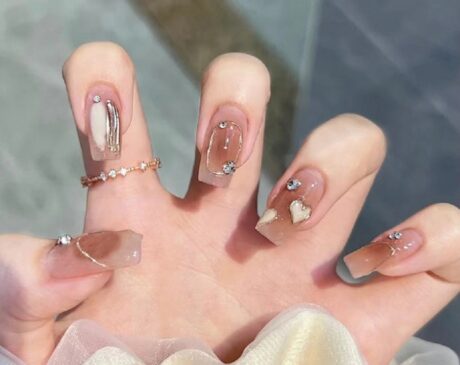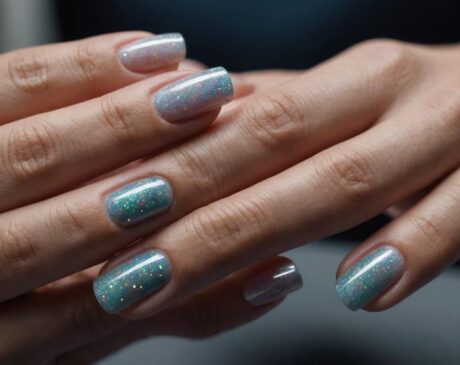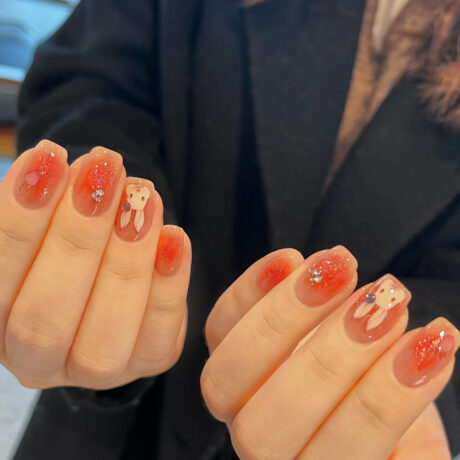What Does Fat Finger Nails Mean?
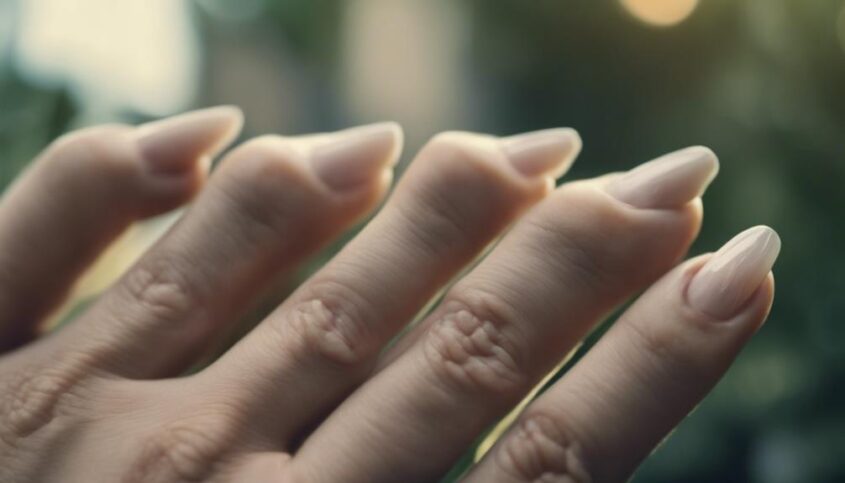
Fat finger nails, or thick nails, may indicate underlying health issues like genetic factors, medical conditions, or nutritional deficiencies. These conditions can include fungal infections, circulation problems, thyroid disorders, and diabetes. It's crucial to monitor nail thickness and seek evaluation from healthcare providers. Lifestyle changes such as moisturizing, proper trimming, and a balanced diet can promote healthier nails. Professional help from dermatologists or nail technicians can offer insights into proper nail care and treatments. Understanding the causes of fat finger nails is essential for overall nail health and well-being. Further insights on nail deformities and preventive strategies are available for comprehensive care.
Key Takeaways
- Fat finger nails can indicate health issues like fungal infections or circulation problems.
- Conditions such as thyroid disorders or diabetes may affect nail growth patterns.
- Nutritional deficiencies can lead to changes in nail texture, thickness, and color.
- Fat finger nails may be linked to obesity, hypothyroidism, and hormonal imbalances.
- Monitoring nail thickness and seeking professional evaluation is essential for early diagnosis and treatment.
Causes of Fat Finger Nails
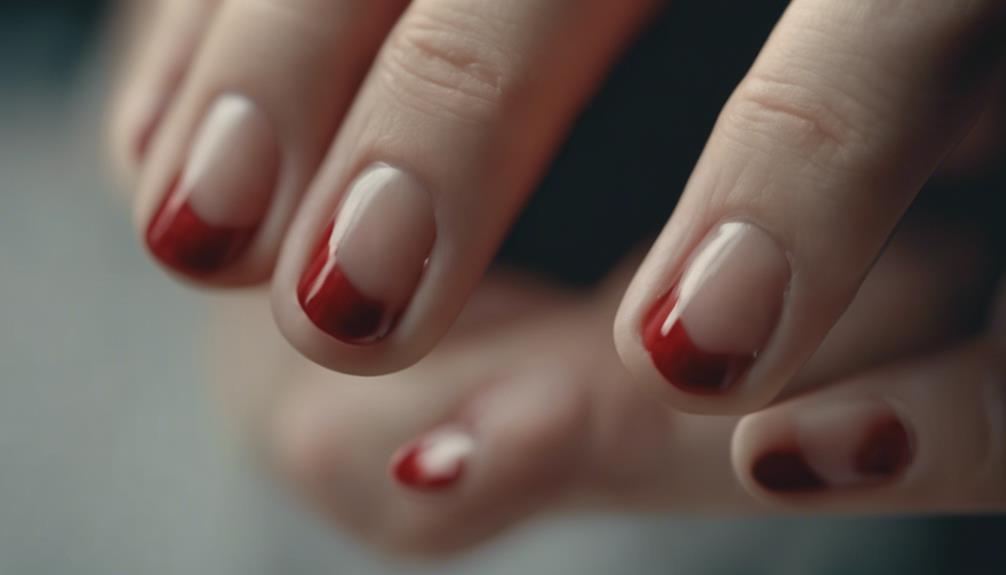
Fat finger nails, also known as clubbed nails, can be caused by various underlying health conditions. One common factor contributing to fat finger nails is abnormal nail growth. When the nails thicken and curve around the fingertips, it can indicate an issue with the nail bed or matrix. Genetic factors also play a significant role in the development of fat finger nails. Certain genetic conditions can impact how the nails grow, leading to clubbing or thickening of the nails.
Understanding the relationship between nail growth and genetic predispositions is crucial in deciphering the root cause of fat finger nails. By examining the unique genetic makeup of individuals, healthcare professionals can better identify potential health concerns related to nail abnormalities. Through innovative genetic testing and analysis, researchers can delve deeper into the mechanisms behind fat finger nails and their correlation with specific genetic markers. This intersection of nail health and genetics opens up new avenues for personalized healthcare interventions tailored to individuals with clubbed nails.
Health Implications of Thick Nails
Thick nails, also known as onychauxis, can indicate underlying health conditions that warrant further investigation by healthcare professionals. Changes in nail thickness can be a result of various factors impacting nail growth. Understanding these nuances is crucial in identifying potential health implications.
| Factors | Description |
|---|---|
| Nail Thickness | Thick nails can suggest issues such as fungal infections, psoriasis, or circulation problems. |
| Nail Growth | Abnormal nail growth patterns, like rapid thickening, may be linked to conditions such as thyroid disorders or diabetes. |
Monitoring changes in nail thickness and growth is essential for early detection of potential health concerns. Consulting with a healthcare provider for proper evaluation and diagnosis is recommended if significant changes are observed. Addressing underlying health issues promptly can lead to better outcomes and overall well-being. Stay proactive in recognizing the signs that your nails may be indicating about your health.
Relation to Nutritional Deficiencies
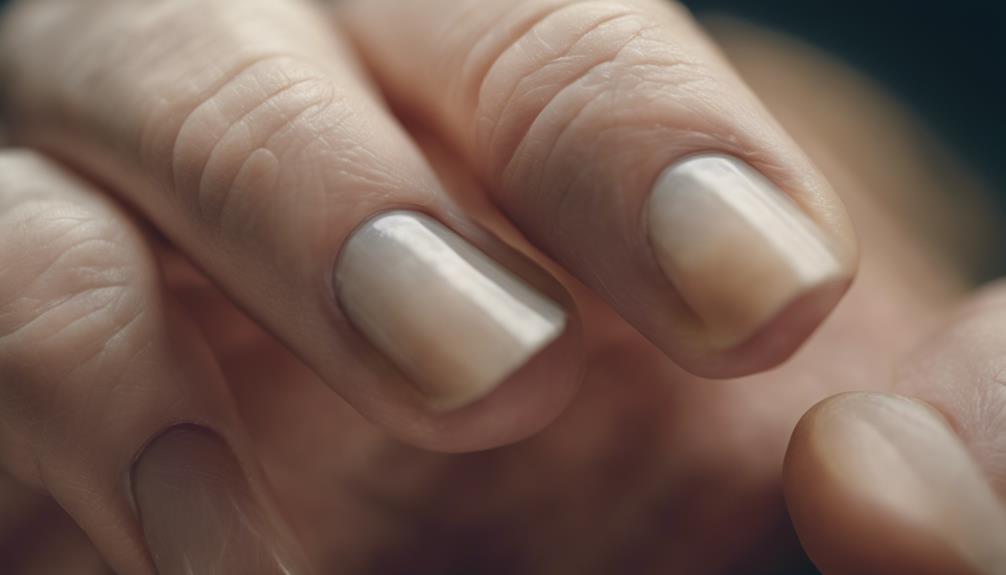
Adequate nutrition plays a vital role in maintaining healthy nails, with deficiencies in essential nutrients potentially contributing to changes in nail appearance and quality. Dietary habits directly impact the health of our nails, as they reflect the overall state of our well-being.
Specifically, vitamin deficiencies can lead to noticeable alterations in nail texture, thickness, and color. For instance, insufficient intake of biotin, commonly known as vitamin B7, can result in brittle nails that are prone to breakage. Similarly, inadequate levels of iron may cause the nails to become thin and concave, presenting a condition known as spoon nails or koilonychia.
Other key vitamins for nail health include vitamin C, which aids in collagen production, and vitamin E, known for its antioxidant properties that promote nail strength. Therefore, maintaining a balanced diet rich in essential vitamins and minerals is crucial for preventing nutritional deficiencies that could manifest as changes in nail structure.
Possible Medical Conditions Linked to Fat Finger Nails
Various medical conditions may be associated with the presence of fat finger nails, indicating underlying health issues that require attention. Nail abnormalities, such as fat finger nails, can be linked to medical conditions like obesity, hypothyroidism, and certain hormonal imbalances.
In cases of obesity, excess fat tissue may lead to changes in the nail bed, causing the nails to appear thicker or wider. Hypothyroidism, a condition where the thyroid gland doesn't produce enough hormones, can also result in nail changes, including thickening and swelling of the nail beds. Additionally, hormonal imbalances, especially those related to conditions like polycystic ovary syndrome (PCOS), can manifest as fat finger nails.
Diagnosis of these underlying medical conditions often requires a comprehensive evaluation by a healthcare provider, which may include blood tests, hormonal assessments, and other diagnostic procedures. Once diagnosed, treatment options may involve addressing the root cause of the condition, such as weight management for obesity or hormone therapy for hormonal imbalances. Prevention strategies may include maintaining a healthy lifestyle, regular monitoring of thyroid function, and seeking prompt medical attention for any noticeable nail abnormalities.
Tips for Improving Nail Health

To enhance nail health, focusing on nail care essentials like keeping nails clean and trimmed is crucial.
Additionally, the impact of a healthy diet rich in nutrients like biotin and vitamin E cannot be overstated for strong nails.
Lastly, maintaining proper hydration levels by drinking an adequate amount of water daily plays a significant role in promoting overall nail health.
Nail Care Essentials
Enhancing the overall health and appearance of your nails requires consistent attention to nail care essentials. To boost nail growth and maintain healthy cuticles, consider the following tips:
- Regular Moisturizing: Keep your nails hydrated with a high-quality moisturizer to prevent brittleness and breakage.
- Proper Trimming: Trim your nails regularly to maintain a neat appearance and prevent snagging and tearing.
- Protective Coatings: Consider using a nail hardener or protective top coat to shield your nails from damage and enhance their strength.
Healthy Diet Impact
Ensuring optimal nail health and strength often begins with a balanced and nutrient-rich diet. Diet choices play a crucial role in promoting strong and healthy nails. Incorporating foods rich in vitamins, minerals, and proteins such as leafy greens, nuts, fish, and eggs can significantly improve nail health.
Additionally, staying hydrated is essential for maintaining nail strength. Alongside diet choices, exercise benefits overall nail health by promoting blood circulation, which in turn nourishes the nail bed. Regular physical activity can contribute to healthier nails by enhancing nutrient delivery to the nail cells.
Proper Hydration Importance
Adequate hydration is a fundamental aspect of maintaining optimal nail health and strength. Proper hydration not only benefits your overall well-being but also plays a crucial role in the appearance and health of your nails.
Here are some hydration tips to improve your nail health:
- Increase your daily water intake to keep your nails hydrated from within.
- Incorporate a moisturizing element into your skincare routine to nourish your nails externally.
- Consider using hydrating nail treatments or oils to promote nail flexibility and prevent brittleness.
When to Seek Professional Help

Knowing when to seek professional help for interpreting fat finger nails is crucial for accurate diagnosis and treatment. If you notice any unusual changes in the appearance of your nails, such as thickening, discoloration, or deformities, it is recommended to consult a dermatologist or a nail specialist. These professionals can conduct a thorough assessment and provide expert advice on the best course of action.
| Signs to Seek Professional Help | Description |
|---|---|
| Thickening of nails | Nails becoming unusually thick may indicate an underlying health issue. |
| Discoloration of nails | Changes in nail color could signal various health conditions that require attention. |
| Nail deformities | Any abnormalities in nail shape should be examined by a professional to rule out serious conditions. |
While nail treatments and beauty salons may offer solutions for cosmetic concerns, it is essential to address any significant changes in your nails promptly to ensure overall nail health. Professional guidance can help in diagnosing potential issues early and preventing further complications.
Lifestyle Changes for Healthy Nails
To maintain optimal nail health and prevent potential issues, adopting lifestyle changes that promote nail strength and resilience is key. Incorporating innovative practices can significantly enhance the overall health and appearance of your nails.
Here are three essential steps to include in your daily routine:
- Nail Strengthening: Utilize nail strengtheners or treatments containing ingredients like biotin, keratin, and vitamins to promote strong and healthy nails. These products can help fortify your nails, reducing the likelihood of breakage and brittleness.
- Cuticle Care: Regularly moisturize your cuticles with nourishing oils such as jojoba or vitamin E oil. Healthy cuticles are essential for protecting the nail bed from infections and maintaining overall nail health.
- Balanced Diet: Ensure your diet includes nutrients essential for nail health, such as protein, zinc, and omega-3 fatty acids. A well-rounded diet can promote strong, resilient nails from the inside out.
Frequently Asked Questions
Can Fat Finger Nails Be a Sign of Aging?
Nail thickness can increase with age, potentially leading to broader nails that may appear "fat." This change can be a sign of aging, as nails tend to thicken and grow more slowly over time.
Are There Any Specific Foods or Supplements That Can Help Improve the Health of Thick Nails?
Innovative approaches to nail health emphasize the impact of nutritional supplements and diet on nail thickness. Encouraging lifestyle changes and optimal hydration can contribute to stronger, healthier nails. Prioritizing these factors can revolutionize nail care.
Can Fat Finger Nails Be a Result of Genetics?
Nail growth can be influenced by genetics, impacting the characteristics of one's nails, including their thickness. Understanding the genetic factors at play can provide insights into why some individuals may have fat finger nails.
Is There a Correlation Between Fat Finger Nails and Certain Skin Conditions?
Nail care is integral to overall skin health, and fat finger nails can indicate underlying conditions. Certain skin issues, like psoriasis or eczema, may manifest in nail abnormalities. Monitoring nail health alongside skin conditions can provide valuable insights for comprehensive care.
Are There Any Specific Nail Care Products That Can Help With Thick, Fat Finger Nails?
When seeking remedies for thick nails, explore innovative nail strengthening treatments. Look for specialized nail care products designed to improve the condition of fat finger nails. Consult with a dermatologist for personalized recommendations.
Conclusion
In conclusion, fat finger nails can be caused by various factors such as genetics, nutritional deficiencies, and underlying medical conditions. It is important to maintain good nail health through proper nutrition, hydration, and regular nail care. Seeking professional help when necessary can help address any underlying health issues contributing to thick nails.
One study found that up to 10% of the population may experience nail abnormalities due to nutritional deficiencies, highlighting the importance of a balanced diet for healthy nails.

